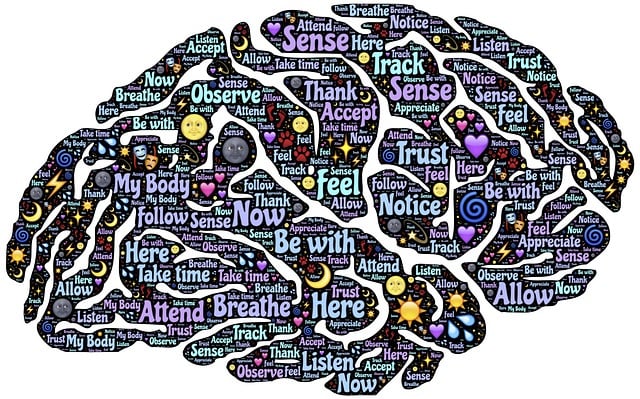The media's portrayal of mental health significantly influences public understanding, with both positive progress and lingering challenges, such as stereotyping complex disorders as plot devices. In Denver and beyond, workplace issues and job stress therapy pose substantial barriers to employee mental wellness due to high-pressure environments, demanding workloads, and lack of support, negatively impacting well-being, productivity, and organizational culture. To combat this, organizations should implement multifaceted approaches including mental health awareness policies, accessible resources, dedicated support systems, crisis intervention guidance, and fostering an inclusive environment. Media can shape societal views by featuring diverse, authentic narratives of mental wellness, relatable characters, coping skills, early intervention, treatment options, and recovery stories to dispel myths and reduce stigma, collaborating with mental health experts for accurate representation.
Mental illness representation in media has long been a topic of debate, with many challenges remaining. This article explores the current landscape of mental health portrayal and delves into specific issues like Denver Workplace Issues and Job Stress Therapy. By analyzing these problems, we identify barriers that hinder effective communication and propose solutions to enhance media depiction, ultimately fostering better mental health awareness and understanding.
Through this comprehensive approach, we aim to revolutionize how mental illness is represented, offering a more nuanced and accurate perspective for a healthier society.
- Understanding Mental Illness Representation in Media: The Current Landscape
- Challenges and Barriers: Denver Workplace Issues and Job Stress Therapy
- Proposed Solutions: Enhancing Media Portrayal for Better Mental Health Awareness
Understanding Mental Illness Representation in Media: The Current Landscape

The media plays a significant role in shaping public understanding of mental health issues, yet current representations often fall short of accuracy and sensitivity. In recent years, there has been a growing awareness of the impact of media portrayal on societal perceptions, especially regarding mental illness. The current landscape is marked by both positive strides and lingering challenges.
On one hand, increased visibility of mental health struggles in popular culture has sparked important conversations, encouraging empathy building strategies and raising awareness about various conditions. However, stereotypes still persist, with many media depictions oversimplifying complex disorders or reducing them to mere plot devices. For instance, the portrayal of depression prevention efforts is often inadequate, presenting simplistic solutions that fail to reflect the reality of Denver workplace issues and job stress therapy. Accurate representation is crucial for fostering understanding and encouraging those seeking mental wellness support.
Challenges and Barriers: Denver Workplace Issues and Job Stress Therapy

In many workplaces, including those in Denver, Denver Workplace Issues and Job Stress Therapy present significant challenges to employee mental health. High-pressure environments, demanding workloads, and a lack of support can contribute to heightened stress levels, leading to anxiety and other mental health concerns. The impact is profound, affecting not only individual well-being but also productivity and overall organizational culture.
Addressing Denver Workplace Issues and Job Stress Therapy requires a multifaceted approach. Organizations must prioritize Mental Health Awareness by implementing policies that encourage open discussions about stress management and provide accessible resources for anxiety relief. Establishing dedicated support systems, offering crisis intervention guidance, and fostering an inclusive environment where employees feel comfortable seeking help are crucial steps towards creating a healthier, more productive workplace.
Proposed Solutions: Enhancing Media Portrayal for Better Mental Health Awareness

Media has a significant role in shaping societal perceptions about mental illness. To bridge the gap between reality and representation, several proposed solutions aim to enhance media portrayal for better mental health awareness. One crucial approach involves encouraging diverse narratives that reflect the complexity of mental wellness experiences across different demographics, including those facing Denver workplace issues and job stress. By showcasing authentic characters grappling with various mental health challenges, media can foster self-awareness exercises and open dialogues about seeking help.
Additionally, integrating scenarios that highlight the development of coping skills can offer practical insights for audiences. Promoting content that emphasizes early intervention, treatment options, and recovery journeys can dispel myths and reduce stigma associated with mental illness. Encouraging industry professionals to consult with experts in mental health ensures accurate representation, ensuring that viewers receive valuable information that promotes both mental wellness and effective coping strategies.
Mental illness representation in media plays a pivotal role in shaping public understanding and empathy. By addressing the challenges posed by Denver workplace issues and job stress therapy through enhanced media portrayal, we can foster better mental health awareness and reduce stigma. It’s crucial to promote accurate, diverse, and empathetic storytelling that reflects the complexities of mental health experiences. Through collective efforts, we can revolutionize media representation, ultimately leading to a more inclusive and supportive society for all.









